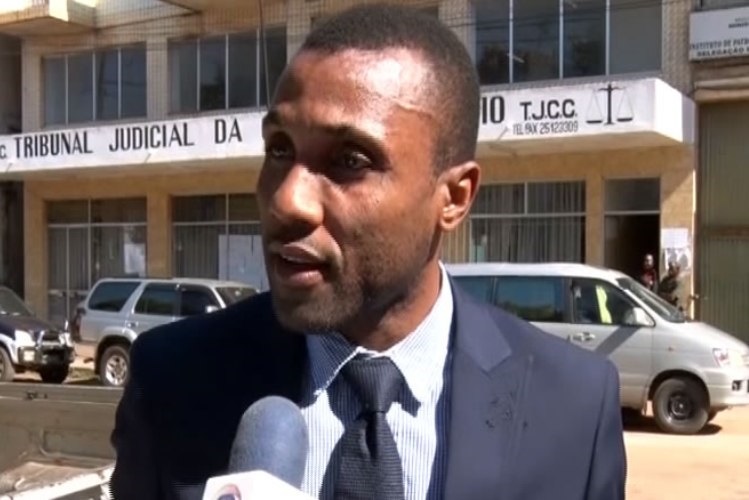“Near-death experience”: Armed robbers attack Catholic sisters’ home for girls in Mozambique
Mozambique: Judge in “hidden debts” case has not resigned

FILE - Judge Efigénio Batista. [File photo: Folha de Maputo]
Mozambique’s Supreme Court has categorically denied rumours that the judge chosen to try the case of the country’s “hidden debts”, Efigenio Baptista, has resigned from the case.
Interviewed by the independent television station, STV, the spokesperson for the Supreme Court, Pedro Nhatitima, said “it is not true that the judge has resigned. On the contrary, he is enthusiastic, and is highly motivated to begin his activities on the case next Monday”.
Nhatitima added that Baptista may well be under pressure. “When somebody is in charge of a case of this size, it’s normal that he might suffer this or that pressure”, he said. “As the State and as the Supreme Court, our duty is to establish the conditions so that the judge, and the others involved in this case, can do their jobs with duly guaranteed security”.
Nhatitima insisted that the case will be tried with full transparency, and that the press will have complete access. “The conditions have been set up so that the information about what will happen during these 45 days (the forecast length of the trial) becomes known to our public”, he said.
Baptista himself told reporters “I am allergic to corruption”, adding “I’m not worried about pleasing anybody. I’m concerned about doing what the law commands. What the law orders me to do, I do, What the law does not order, I don’t do. End of story”.
Stories have circulated in the media that Baptista has had a chequered career. When he was a district judge in the central province of Manica, he was sentenced to three months imprisonment for issuing threats, and to five months for an assault. Both sentences were converted into fines.
Baptista told STV this was far from the whole story. “I’ve heard people say that I was sentenced to three months in jail”, he said. “It’s true – they sentenced me to three months, but I appealed, and the Appeals Court in Beira annulled the sentence”.
The appeals court also annulled the five month sentence, he added. “So I have no criminal record. But people just use the decision which most interests them. I don’t know why they don’t quote the second decision which annulled the first one”.
It has also been claimed that Baptista was so unpopular when he worked in Caia district, in Sofala province, that an unknown group of people burnt his house down. “It’s not true”, he told STV. “Nobody burnt my house down anywhere”.
The 42 year old Baptista has ten years’ experience as a judge. He took his law course at Maputo’s Eduardo Mondlane University, where he was regarded as one of the best students, with the highest marks in his year. He worked as a district judge in Manica, Tete and Sofala provinces, and was promoted to the criminal section of the Maputo City court this year.
According to STV, he has a reputation for being severe in his decision. When he heard the case of the kidnap of businessman Manish Cantilal, he sentenced two kidnappers to 20 years imprisonment, but acquitted a third accused, for lack of evidence.
The case of the “hidden debts” refers to the loans, in 2013 and 2014, of over two billion US dollars granted by the banks Credit Suisse and VTB of Russia to three fraudulent, security-linked Mozambican companies, Proindicus, Ematum (Mozambique Tuna Company) and MAM (Mozambique Asset Management).
The negotiations leading up to the loans involved at least three corrupt officials from Credit Suisse, who have admitted to taking bribes, and officials of the Abu Dhabi based group Privinvest, notably Jean Boustani. Between them, they ensured that the Mozambican government of the day, led by Armando Guebuza, issued illegal loan guarantees, covering the entire two billion dollars.
The effect of the guarantees was that, if the companies defaulted (as they have done), then the Mozambican government would be held liable for repaying the loans. But the guarantees violated the budget laws of 2013 and 2014 and the Mozambican constitution. The loans and their guarantees have been declared unconstitutional by the Constitutional Council, Mozambique’s highest body in matters of constitutional law.
Privinvest, which became the sole contractor for the three fraudulent companies, sat at the heart of a network of corruption. According to US prosecutors investigating the case, Privinvest used at least 200 million dollars of the loan money for bribes and kickbacks. Privinvest profited because, according to an independent audit, it sold equipment to the three companies at vastly inflated prices.
19 people will be on trial next week. They include Ndambi Guebuza, the oldest son of former president Armando Guebuza, Gregorio Leao, the head of the Security and Intelligence Service (SISE) under Guebuza, Antonio do Rosario, the SISE officer who became chairperson of all three fraudulent companies, Guebuza’s political adviser, Renato Matusse, and his private secretary Ines Moiane.
With such a large number of defendants, and given the huge public interest in the case, no courtroom in Maputo is large enough for the proceedings. So the case will be tried under canvas – in a huge tent erected on the grounds of the Maputo top security prison.













Leave a Reply
Be the First to Comment!
You must be logged in to post a comment.
You must be logged in to post a comment.